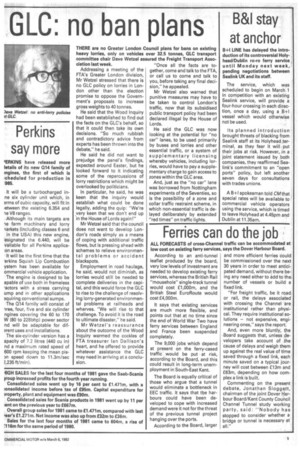GLC: no ban plans
Page 5

If you've noticed an error in this article please click here to report it so we can fix it.
THERE are no Greater London Council plans for bans on existing heavy lorries, only on vehicles over 32.5 tonnes, GLC transport committee chair Dave Wetzel assured the Freight Transport Association last week.
Addressing a meeting of the FTA's Greater London division, Mr Wetzel stressed that there is no GLC policy on lorries in London other than the election promise to oppose the Government's proposals to increase gross weights to 40 tonnes.
He said that the Wood Inquiry had been established to find out the facts on the GLC's behalf, so that it could then take its own decisions. "So much rubbish and contradictory advice from experts has been thrown into the debate," he said.
He said he did not want to prejudge the panel's findings, expected around Easter, but he looked forward to it indicating some of the repercussions of lorry restrictions which might be overlooked by politicians.
In particular, he said, he was keen that the inquiry would establish what could be done legally, adding the quip: "We're ,very keen that we don't end up in the House of Lords again!"
Mr Wetzel said that the council does not want to develop London's roads simply as a means of coping with additional traffic flows, but is pressing ahead with schemes to relieve environmental problems or accident blackspots.
Employment in road haulage, he said, would not diminish, as lorries would still be needed to complete deliveries in the capital, and this would force the GLC to rise to the challenge of resolving lorry-generated environmental problems at railheads and wharves. "We will rise to that challenge. To avoid it is the road to ultimate disaster," he said.
Mr Wetzel's reassurance about the outcome of the Wood Inquiry warmed the cockles of FTA treasurer Ian Dailison's heart, and he offered to provide whatever assistance the GLC may need in arriving at a conclusion. "Once all the facts are together, come and talk to the FTA, or call us to come and talk to you, before taking any final decision," he appealed.
Mr Wetzel also warned that punitive measures may have to be taken to control London's traffic, now that its subsidised public transport policy had been declared illegal by the House of Lords.
He said the GLC was now looking at the potential for "no car" lanes, to be used primarily by buses and lorries and other essential traffic, or a system of supplementary licensing whereby vehicles, including lorries, would have to pay a supplementary charge to gain access to zones within the GLC area.
And, just as the "no car" lane was borrowed from Nottingham experiments of the Seventies, so is the possibility of a zone and collar traffic restraint scheme, in which non-essential traffic is delayed deliberately by extended "red times" on traffic lights.
































































